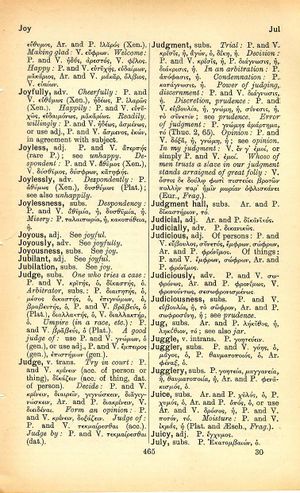judgment: Difference between revisions
Μεστὸν κακῶν πέφυκε φορτίον γυνή → Mulier malorum plena semper sarcina est → Die Frau ist eine Last, mit Leiden vollgepackt
(Woodhouse 3) |
(CSV4) |
||
| Line 1: | Line 1: | ||
{{ | {{Woodhouse1 | ||
| | |Text=[[File:woodhouse_465.jpg|thumb|link={{filepath:woodhouse_465.jpg}}]]'''subs.''' | ||
<b class="b2">Trial</b>: P. and V. [[κρίσις]], ἡ, [[ἀγών]], ὁ, [[δίκη]], ἡ. | |||
<b class="b2">Decision</b> P. and V. [[κρίσις]], ἡ, P. [[διάγνωσις]], ἡ, [[διάκρισις]], ἡ. | |||
<b class="b2">In an arbitration</b>: P. [[ἀπόφασις]], ἡ. | |||
<b class="b2">Condemnation</b>: P. [[κατάγνωσις]], ἡ. | |||
<b class="b2">Power of judging, discernment</b>: P. and V. [[διάγνωσις]], ἡ. | |||
<b class="b2">Discretion, prudence</b>: P. and V. [[εὐβουλία]]. ἡ, [[γνώμη]], ἡ, [[σύνεσις]], ἡ, τὸ συνετόν; see [[prudence]]. | |||
<b class="b2">Error</b> <b class="b2">of judgment</b>: P. γνώμης [[ἁμάρτημα]], τό (Thuc. 2, 65). | |||
<b class="b2">Opinion</b>: P. and V. [[δόξα]], ἡ, [[γνώμη]], ἡ; see [[opinion]]. | |||
<b class="b2">In my judgment</b>: V. ἔν γʼ ἐμοί, or simply P. and V. ἐμοί. | |||
<b class="b2">Whoso of men trusts a slave in our judgment stands arraigned of great folly</b>: V. [[ὅστις]] δὲ δούλῳ φωτὶ πιστεύει βροτῶν πολλὴν παρʼ ἡμῖν μωρίαν ὀφλισκάνει (Eur., <b class="b2">Frag.</b>). | |||
}} | }} | ||
Revision as of 09:45, 21 July 2017
English > Greek (Woodhouse)
subs.
Trial: P. and V. κρίσις, ἡ, ἀγών, ὁ, δίκη, ἡ. Decision P. and V. κρίσις, ἡ, P. διάγνωσις, ἡ, διάκρισις, ἡ. In an arbitration: P. ἀπόφασις, ἡ. Condemnation: P. κατάγνωσις, ἡ. Power of judging, discernment: P. and V. διάγνωσις, ἡ. Discretion, prudence: P. and V. εὐβουλία. ἡ, γνώμη, ἡ, σύνεσις, ἡ, τὸ συνετόν; see prudence. Error of judgment: P. γνώμης ἁμάρτημα, τό (Thuc. 2, 65). Opinion: P. and V. δόξα, ἡ, γνώμη, ἡ; see opinion. In my judgment: V. ἔν γʼ ἐμοί, or simply P. and V. ἐμοί. Whoso of men trusts a slave in our judgment stands arraigned of great folly: V. ὅστις δὲ δούλῳ φωτὶ πιστεύει βροτῶν πολλὴν παρʼ ἡμῖν μωρίαν ὀφλισκάνει (Eur., Frag.).

